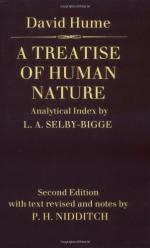
|
1. In terms of philosophy what is empiricism?
David Hume is what is known as a empiricist, meaning he believes our knowledge of the world comes primarily through experience.
2. What does Hume say are simple perceptions?
Hume states that simple perceptions are ideas so basic they can't be divided; for example, taste. They usually come together to form a more complex idea. An apple, for example, is made up of simple perceptions such as taste, color and smell.
3. What is the difference between reflexion and sensation impressions?
Hume states that sensation impressions arise from our soul from unknown causes, whereas reflexion impressions derive from ideas.
4. How does Hume claim an idea is formed?
Hume claims an idea is formed after an impression hits us. For example, we first feel pain, but when the impression of pain leaves us we are left with the idea that we have just felt pain. In this regard, Hume states the mind takes a copy of the impression, which then becomes the idea.
(read all 60 Short Essay Questions and Answers)
|
This section contains 2,794 words (approx. 10 pages at 300 words per page) |

|




